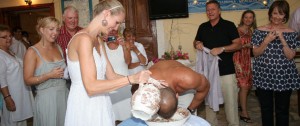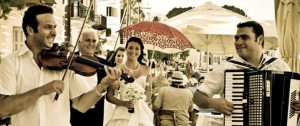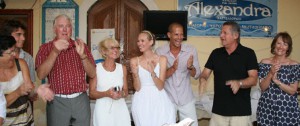Savatovratho Pre-wedding Custom
Savatovratho means the “Saturday night before the wedding” as traditionally marriages were on a Sunday. It is the bride’s last “trapeze” that is, the feast or table with her family as a single person.
Traditionally, male children would go to the mountain on a Friday morning to collect “votania” which is a herb similar to lavender. They would bring it down to Holy Trinity (Ayia Triatha) Monastery and leave it overnight where it was blessed. On Saturday morning, the young boys collected it, brought it down from the Ayia Triatha Monastery in a bundle, and wrapped in a cloth. One of the children carried it on his head, followed by other children singing “Apo ta votania Pefto”.
lavender. They would bring it down to Holy Trinity (Ayia Triatha) Monastery and leave it overnight where it was blessed. On Saturday morning, the young boys collected it, brought it down from the Ayia Triatha Monastery in a bundle, and wrapped in a cloth. One of the children carried it on his head, followed by other children singing “Apo ta votania Pefto”.
 There would be two parties: one for the nifi (bride) and one for the gambro (groom). After a while, the gambro’s family would visit the nifi’s family and it would become one large party. Both sides of the family sing traditional Kastellorizian wedding songs with responses going back and forth. It becomes quite competitive and it usually begins with the groom’s side of the family singing how lucky the nifi is to be receiving such a handsome man and a great ‘catch’. Similarly, the nifi’s side of the family respond by saying how lucky the groom is to be getting a beautiful girl. It is like a sparring match.
There would be two parties: one for the nifi (bride) and one for the gambro (groom). After a while, the gambro’s family would visit the nifi’s family and it would become one large party. Both sides of the family sing traditional Kastellorizian wedding songs with responses going back and forth. It becomes quite competitive and it usually begins with the groom’s side of the family singing how lucky the nifi is to be receiving such a handsome man and a great ‘catch’. Similarly, the nifi’s side of the family respond by saying how lucky the groom is to be getting a beautiful girl. It is like a sparring match.
The clothes of the bride and groom are laid out in a large room where the priest blesses them and he lights frankincense. After the clothes are blessed, the votania are thrown to the crowd and the singing and dancing begin.
Money is collected and shared by all the children present, including the boys who collected the votania from the mountain.
Later during the dancing, the fathers of the couple throw coins into the air, which is also collected and shared by the children.
Traditional food is pilafi and chicken; the rice signifying binding together and taking root.
The groom has to leave before midnight, as he is not supposed to see the nifi (bride) until her arrival at the church on their wedding day.
It is a joyous, informal occasion with lots of tradition and meaning that prepares for the big occasion the following day.
To my mind, it also signifies the passing from one stage to another in our lives, leaving our parents to form our own family and formally beginning life as a couple whilst still honouring and remembering them and their cultural heritage.
Written by Marilyn Tsolakis as told to her by her father, Michael who had firsthand experience as a boy taking part in this tradition on Kastellorizo.
